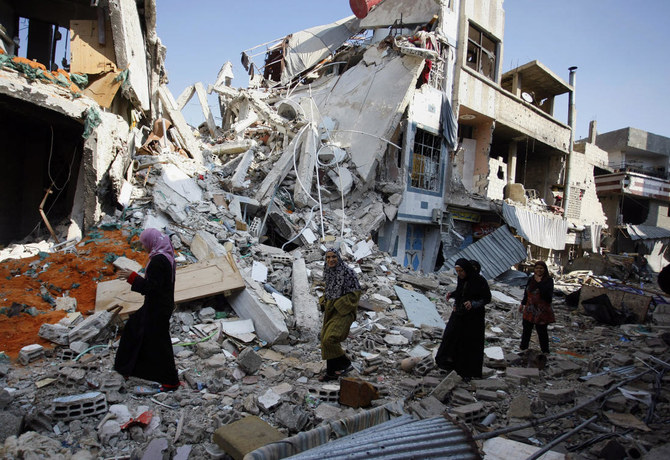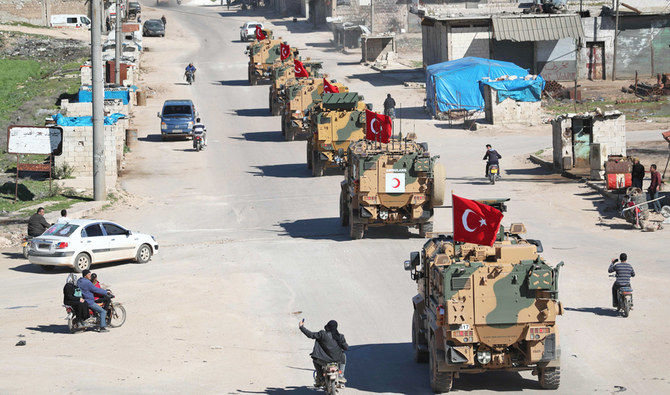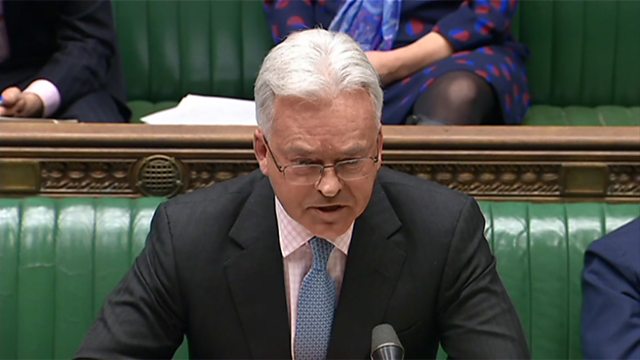angelburst29
The Living Force
The U.S. needs to stop playing by Israel's dictates and rules and release the chains that bind? (!!!) Another case of ...
U.S. drops reference to 'Israeli-occupied' Golan Heights in annual rights report
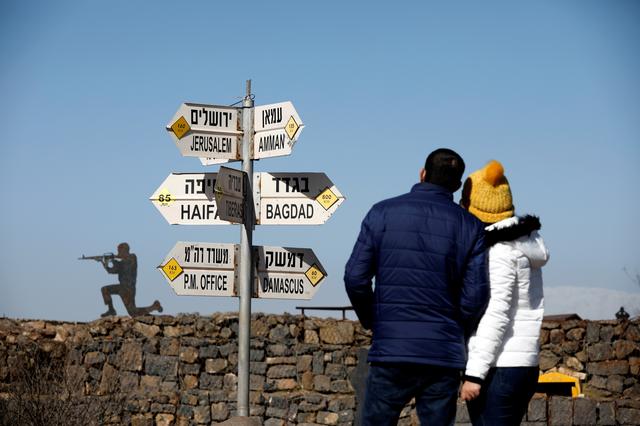
The U.S. State Department changed its usual description of the Golan Heights from "Israeli-occupied" to "Israeli-controlled" in an annual global human rights report released on Wednesday.
... so Israel can pull off this scheme ...
Israel says Hezbollah suspect in U.S. troop deaths now active on Golan
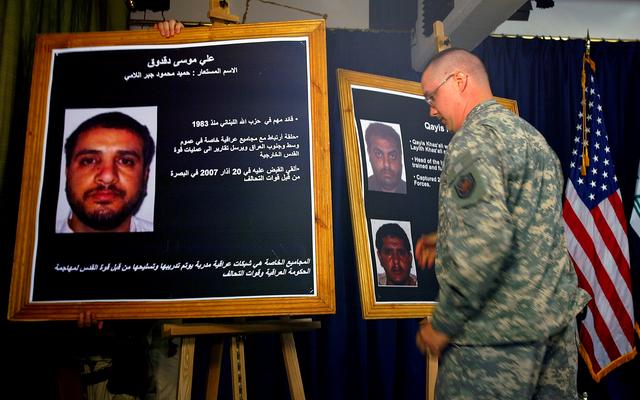
Israel on Wednesday accused a suspected Lebanese Hezbollah operative who was previously held in Iraq over the killing of five U.S. military personnel of now setting up a Syrian guerrilla network for cross-border attacks on Israeli targets.
The accusations against Ali Mussa Daqduq came as Israel seeks U.S. recognition of its claim of sovereignty over parts of the Golan Heights, a strategic plateau on the Syrian frontier, which it captured in a 1967 war and deems a key security buffer.
With Syrian President Bashar al-Assad reasserting control after an 8-year insurgency, Israel has also been lobbying his big-power backer Russia to keep Hezbollah and Damascus’ other Iranian-aligned reinforcements away from the Syrian-held parts of Golan.
Israel’s acting foreign minister was quoted as saying such U.S. recognition would be “an appropriate” response to what he said was increased Hezbollah activity on the Golan.
2019-03-13 - Israel claims new Hezbollah network along Syrian border
Israel claims new Hezbollah network along Syrian border

According to a statement from the Israeli Defense Forces (IDF), their military uncovered the Hezbollah network inside the Syrian province of Al-Quneitra, which borders the occupied Golan Heights.
“The network is new and currently focused on becoming familiarized with the Golan Heights area. It is intended to eventually control teams of Syrian operatives who will launch attacks against Israel,” the IDF said in a statement, as quoted by the Times of Israel.
The IDF says the Hezbollah is focused on the border region, near the provincial capital of the Al-Quneitra Governorate.
Furthermore, the Hezbollah network is believed to stretch from the provincial capital to the Druze town of Hader, which is located near the cross-border Druze town of Majdal Shams.
The commander of the IDF’s Golan Division, Brigadier General Amit Fisher, said the military “will act with all our might to force this terrorist organization out of the Golan Heights and ensure the stability of the region.”
Last month, the Israeli Defense Forces attacked the Syrian Arab Army’s (SAA) positions inside the Al-Quneitra Governorate.
This attack resulted in the death of a few soldiers from Iran’s Islamic Revolutionary Guard Corps (IRGC), thus revealing the group’s presence near the demilitarized zone.
March 13, 2019 - Russian Aerospace Force destroys terrorist weapons depot in Syria’s Idlib
Russian Aerospace Force destroys terrorist weapons depot in Syria’s Idlib

© Vadim Grishankin/Russian Defense Ministry's Press and Information Department/TASS
A pinpoint airstrike was carried out on March 13 in coordination with Turkey.The airstrike "targeted a weapons depot belonging to the Hayat Tahrir al-Sham (Jabhat al-Nusra) terror group in the city of Idlib," the ministry said.
"According to information confirmed through several channels, militants earlier brought a large number of combat unmanned aerial vehicles to the facility, which they planned to use for attacks on Russia’s Hmeimim air base," the statement adds.
A thing to note is that Russia’s military facilities in Syria have on numerous occasions been attacked with unmanned aerial vehicles.
On January 6, 2018, militants carried out a large-scale drone strike on the Hmeimim air base and a naval facility in Tartus. The Russian military either destroyed or took control of the UAVs used in the attack. A Defense Ministry source noted at the time that "the programming of systems to control unmanned aerial vehicles and drop GPS-guided munitions requires completing engineering studies in a developed country."
Russian Deputy Defense Minister Alexander Fomin said, in turn, that the drones involved in the January 2018 attack on the Hmeimim base were run from a US Boeing P-8A Poseidon aircraft. When the drones were confronted by Russian jamming systems, they went to manual mode controlled from the US aircraft.
March 13, 2019 - Russian Air Force unleashes massive assault across Idlib
Breaking: Russian Air Force unleashes massive assault across Idlib
Led by the Sukhoi jets, the Russian Air Force heavily bombarded several bases and storage facilities belonging to Hay’at Tahrir Al-Sham near Idlib city.
The source said the Russian Air Force managed to hit their targets in the Idlib Governorate, causing several explosions in the process.
He would add that the Russian Air Force is likely to keep bombarding the jihadist sites the Syrian Arab Army (SAA) prepares to launch their long-awaited offensive in northern Hama and southern Idlib.
2019-03-12 - Russian Navy enters Syrian waters for new mission
Russian Navy enters Syrian waters for new mission

“A squadron of ships and logistics vessels of the Northern Fleet including the frigate Admiral Flota Sovetskogo Soyuza Gorshkov, the multifunctional logistics support ship Elbrus, the salvage tug Nikolay Chiker and the medium-sized sea tanker Kama passed through the Strait of Gibraltar last night and entered the Mediterranean Sea,” the press service announced.
In the coming days, the squadron will continue to perform its Mediterranean long-distance deployment objectives.
2019-03-13 - US spending $250 million to build border security force in Syria (... but Trump can't get funding for OUR Border?)
US spending $250 million to build border security force in Syria

During a presentation by the Department of Defense, a reporter asked about the inaudible money that is going to be used to train a border security force inside Syria, despite U.S. President Donald Trump’s decision to withdraw most of the American forces from the country.
“So as we know, this year the fight against ISIS in Syria is rolling out, and that the U.S. forces are pulling out of Syria, but we see that still the budget allocates $300 million for Syrian training (inaudible) program and then $250 million for the border security of that — in that country.
Can you explain how this (inaudible) money will be used and who the U.S. is going to train, as the U.S. is already pulling out and the fight against ISIS is coming to be over?”
In response to the question, two officials gave their take on the funding:
DEPUTY COMPTROLLER MCCUSKER: I’ll start and then let General Ierardi comment. I think what you’re seeing in our budget is a reflection as, you know, an updated part of the strategy on sort of where we stand in defeating ISIS, but also continued emphasis on our second line of effort, which is our — our partnerships and our allies and their critical role in, you know, maintaining the — the gains that we’ve achieved in that area.
LT. GEN. IERARDI: I think we’ll adjust as appropriate as we move forward. As we built this — this budget, it was based on the information at the time, still is an important part of the overall request and we’ll — we’ll adjust as — as necessary.
The U.S. is planning to build a new security force in northern Syria, which will ultimately be tasked with protecting the area along the Turkish border.
U.S. sees Turkish offensive in Syria as unnecessary: U.S. official
The United States is not discussing a Turkish offensive in northeast Syria with Turkey and believes no such operation is needed
to address Ankara's security concerns, a U.S. official told Reuters on Wednesday, dismissing media reports to the contrary.
U.S. drops reference to 'Israeli-occupied' Golan Heights in annual rights report
The U.S. State Department changed its usual description of the Golan Heights from "Israeli-occupied" to "Israeli-controlled" in an annual global human rights report released on Wednesday.
... so Israel can pull off this scheme ...
Israel says Hezbollah suspect in U.S. troop deaths now active on Golan
Israel on Wednesday accused a suspected Lebanese Hezbollah operative who was previously held in Iraq over the killing of five U.S. military personnel of now setting up a Syrian guerrilla network for cross-border attacks on Israeli targets.
The accusations against Ali Mussa Daqduq came as Israel seeks U.S. recognition of its claim of sovereignty over parts of the Golan Heights, a strategic plateau on the Syrian frontier, which it captured in a 1967 war and deems a key security buffer.
With Syrian President Bashar al-Assad reasserting control after an 8-year insurgency, Israel has also been lobbying his big-power backer Russia to keep Hezbollah and Damascus’ other Iranian-aligned reinforcements away from the Syrian-held parts of Golan.
Israel’s acting foreign minister was quoted as saying such U.S. recognition would be “an appropriate” response to what he said was increased Hezbollah activity on the Golan.
In statements based on what it described as previously classified intelligence, the Israeli military said Hezbollah had mobilized “a few operatives, Syrians” as part of a new “terror network on the Syrian Golan Heights aimed at striking Israel”.
The military said it believed Daqduq to be the network’s mastermind.
Iraqi Detention - Daqduq was released from detention in 2012 in Iraq, where he had been accused by the United States of orchestrating a 2007 kidnapping that resulted in the killing of five U.S. military personnel.
The United States had handed Daqduq over to Baghdad in 2011 after failing to secure a custody deal ahead of the U.S. military’s withdrawal from Iraq. Washington said it had received Baghdad’s assurances Daqduq would be prosecuted, but he was later cleared by an Iraqi court and repatriated to Lebanon.
There was no immediate response to Israel’s allegations on Wednesday from Hezbollah, Syria or the U.S. and Russian embassies in Israel.
U.S. diplomats have said they are in talks with Israel about its request to recognize its sovereignty on the Golan, a status that has yet to win any formal endorsement among world powers.
Israel’s Mako news site quoted acting Foreign Minister Israel Katz of saying that such recognition by the United States would be “an appropriate and required response” to the allegations about Hezbollah’s activity on the Syrian Golan.
“I hope that this will soon happen, during the prime minister’s upcoming visit to Washington,” Katz was quoted as saying. Prime Minister Benjamin Netanyahu is due to address the pro-Israel lobby group AIPAC in the U.S. capital in late March.
In the past, Russia has spoken in favor of other foreign forces leaving Syria, though it plans to keep a garrison there.
Israel claimed on Wednesday that their military had uncovered a Hezbollah cell near the border of the occupied Golan Heights.
2019-03-13 - Israel claims new Hezbollah network along Syrian border
Israel claims new Hezbollah network along Syrian border

According to a statement from the Israeli Defense Forces (IDF), their military uncovered the Hezbollah network inside the Syrian province of Al-Quneitra, which borders the occupied Golan Heights.
“The network is new and currently focused on becoming familiarized with the Golan Heights area. It is intended to eventually control teams of Syrian operatives who will launch attacks against Israel,” the IDF said in a statement, as quoted by the Times of Israel.
The IDF says the Hezbollah is focused on the border region, near the provincial capital of the Al-Quneitra Governorate.
Furthermore, the Hezbollah network is believed to stretch from the provincial capital to the Druze town of Hader, which is located near the cross-border Druze town of Majdal Shams.
The commander of the IDF’s Golan Division, Brigadier General Amit Fisher, said the military “will act with all our might to force this terrorist organization out of the Golan Heights and ensure the stability of the region.”
Last month, the Israeli Defense Forces attacked the Syrian Arab Army’s (SAA) positions inside the Al-Quneitra Governorate.
This attack resulted in the death of a few soldiers from Iran’s Islamic Revolutionary Guard Corps (IRGC), thus revealing the group’s presence near the demilitarized zone.
The Russian Aerospace Force has destroyed a weapons depot belonging to the Hayat Tahrir al-Sham terror group (also known as Jabhat al-Nusra, outlawed in Russia) in the Syrian province of Idlib, the Russian Defense Ministry said in a statement on Wednesday.
March 13, 2019 - Russian Aerospace Force destroys terrorist weapons depot in Syria’s Idlib
Russian Aerospace Force destroys terrorist weapons depot in Syria’s Idlib

© Vadim Grishankin/Russian Defense Ministry's Press and Information Department/TASS
A pinpoint airstrike was carried out on March 13 in coordination with Turkey.The airstrike "targeted a weapons depot belonging to the Hayat Tahrir al-Sham (Jabhat al-Nusra) terror group in the city of Idlib," the ministry said.
"According to information confirmed through several channels, militants earlier brought a large number of combat unmanned aerial vehicles to the facility, which they planned to use for attacks on Russia’s Hmeimim air base," the statement adds.
A thing to note is that Russia’s military facilities in Syria have on numerous occasions been attacked with unmanned aerial vehicles.
On January 6, 2018, militants carried out a large-scale drone strike on the Hmeimim air base and a naval facility in Tartus. The Russian military either destroyed or took control of the UAVs used in the attack. A Defense Ministry source noted at the time that "the programming of systems to control unmanned aerial vehicles and drop GPS-guided munitions requires completing engineering studies in a developed country."
Russian Deputy Defense Minister Alexander Fomin said, in turn, that the drones involved in the January 2018 attack on the Hmeimim base were run from a US Boeing P-8A Poseidon aircraft. When the drones were confronted by Russian jamming systems, they went to manual mode controlled from the US aircraft.
The Russian Air Force has unleashed a massive assault across the Idlib Governorate this afternoon, targeting several areas under the control of the jihadist rebels near the provincial capital.
March 13, 2019 - Russian Air Force unleashes massive assault across Idlib
Breaking: Russian Air Force unleashes massive assault across Idlib
Led by the Sukhoi jets, the Russian Air Force heavily bombarded several bases and storage facilities belonging to Hay’at Tahrir Al-Sham near Idlib city.
The source said the Russian Air Force managed to hit their targets in the Idlib Governorate, causing several explosions in the process.
He would add that the Russian Air Force is likely to keep bombarding the jihadist sites the Syrian Arab Army (SAA) prepares to launch their long-awaited offensive in northern Hama and southern Idlib.
Russian Northern Fleet frigate Admiral Gorshkov and its convoy passed through Gibraltar and crossed into the Mediterranean Sea as part of its long-range operational cruise, the Northern Fleet press service told TASS on Tuesday.
2019-03-12 - Russian Navy enters Syrian waters for new mission
Russian Navy enters Syrian waters for new mission

“A squadron of ships and logistics vessels of the Northern Fleet including the frigate Admiral Flota Sovetskogo Soyuza Gorshkov, the multifunctional logistics support ship Elbrus, the salvage tug Nikolay Chiker and the medium-sized sea tanker Kama passed through the Strait of Gibraltar last night and entered the Mediterranean Sea,” the press service announced.
In the coming days, the squadron will continue to perform its Mediterranean long-distance deployment objectives.
The U.S. military’s 2020 budget will see over $550 million allocated to training and developing forces inside Syria, a new report from the Department of Defense read this week.
2019-03-13 - US spending $250 million to build border security force in Syria (... but Trump can't get funding for OUR Border?)
US spending $250 million to build border security force in Syria

During a presentation by the Department of Defense, a reporter asked about the inaudible money that is going to be used to train a border security force inside Syria, despite U.S. President Donald Trump’s decision to withdraw most of the American forces from the country.
“So as we know, this year the fight against ISIS in Syria is rolling out, and that the U.S. forces are pulling out of Syria, but we see that still the budget allocates $300 million for Syrian training (inaudible) program and then $250 million for the border security of that — in that country.
Can you explain how this (inaudible) money will be used and who the U.S. is going to train, as the U.S. is already pulling out and the fight against ISIS is coming to be over?”
In response to the question, two officials gave their take on the funding:
DEPUTY COMPTROLLER MCCUSKER: I’ll start and then let General Ierardi comment. I think what you’re seeing in our budget is a reflection as, you know, an updated part of the strategy on sort of where we stand in defeating ISIS, but also continued emphasis on our second line of effort, which is our — our partnerships and our allies and their critical role in, you know, maintaining the — the gains that we’ve achieved in that area.
LT. GEN. IERARDI: I think we’ll adjust as appropriate as we move forward. As we built this — this budget, it was based on the information at the time, still is an important part of the overall request and we’ll — we’ll adjust as — as necessary.
The U.S. is planning to build a new security force in northern Syria, which will ultimately be tasked with protecting the area along the Turkish border.
U.S. sees Turkish offensive in Syria as unnecessary: U.S. official
The United States is not discussing a Turkish offensive in northeast Syria with Turkey and believes no such operation is needed
to address Ankara's security concerns, a U.S. official told Reuters on Wednesday, dismissing media reports to the contrary.

 Giggle! The U.S. fiat currency is also "un-worth-able"! (That's not in the Webster's Dictionary, either?)
Giggle! The U.S. fiat currency is also "un-worth-able"! (That's not in the Webster's Dictionary, either?)  The metal in a copper penny is worth more!
The metal in a copper penny is worth more!